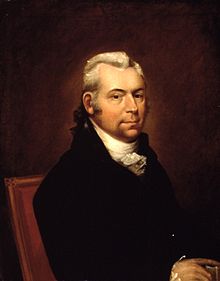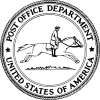Gideon Granger
Gideon Granger | |
|---|---|
 | |
| 7th United States Postmaster General | |
| In office November 28, 1801 – March 17, 1814 | |
| President | Thomas Jefferson James Madison |
| Preceded by | Joseph Habersham |
| Succeeded by | Return J. Meigs, Jr. |
| Personal details | |
| Born | July 19, 1767 Suffield, Connecticut, British America |
| Died | December 31, 1822 (aged 55) Canandaigua, New York, U.S. |
| Political party | Democratic-Republican |
| Spouse |
Mindwell Pease (m. 1790) |
| Children | 3, including Francis |
| Education | Yale University (BA) |
| Signature |  |
Gideon Granger (July 19, 1767 – December 31, 1822) was an early American politician and lawyer. He was the father of fellow Postmaster General and U.S. Representative Francis Granger.[1]
Early life
[edit]Granger was born in Suffield, Connecticut on July 19, 1767. He was the son of Gideon Granger (1735–1800) and Tryphosia (née Kent) Granger (1738–1796).[2][3]
He attended and graduated from Yale University and became a lawyer.[4]
Career
[edit]Granger was considered a brilliant political essayist. Using the pseudonyms Algernon Sydney and Epaminondas many of his writings, defending Jeffersonian principles, were published in many pamphlets.
He was a member of the Connecticut House of Representatives and ran unsuccessfully for the United States Congress in the 1797 special election for one of Connecticut's at-large congressional seats[5]. A staunch supporter of Thomas Jefferson, Granger was appointed as Postmaster General at the start of his term in 1801. He served in this post until 1814 when Jefferson's successor, James Madison, replaced him.[2] He is the longest serving Postmaster General as of 2022.
After leaving Washington, D.C., Granger settled in Canandaigua, New York, where he built a homestead that would be "unrivaled in all the nation" from which he could administer the many land tracts he had acquired farther to the west. Today his home is a museum. He became a member of the New York Senate and continued to be influential in politics and law including being a key figure in the Erie Canal project.
Personal life
[edit]On June 14, 1790, Granger was married to Mindwell Pease (1770–1860), the daughter of Joseph Pease.[6] Together, they were the parents of three sons, including:[3]
- Francis Granger (1792–1868), who married Cornelia Rutsen Van Rensselaer (1798–1823), the granddaughter of Brigadier General Robert Van Rensselaer,[7][8][9] who was a member of the New York Provincial Congress from 1775 to 1777 and later a member of the New York State Assembly in the 1st, 2nd and 4th New York State Legislatures.[10]
- John Albert Granger (1795–1870),[4] who married Harriet Jackson (1804–1868), the daughter of Amasa Jackson, the first president of the Union Bank of New York, and Mary (née Phelps) Jackson, the only daughter and heiress of Oliver Phelps. Her paternal grandfather was General Michael Jackson, who commanded a regiment of minutemen in the Battle of Lexington.[11]
Ill health forced him to retire early in 1821 and he died the next year on December 31, 1822. He was interred in Woodlawn Cemetery in Canandaigua. Granger is the namesake of Granger Township, Ohio.[12]
References
[edit]- ^ The Century Dictionary and Cyclopedia: The Century cyclopedia of names ... ed. by Benjamin E. Smith. Century Company. 1903. p. 454.
- ^ a b Sobel, Robert (1990). Biographical Directory of the United States Executive Branch, 1774-1989. Greenwood Publishing Group. p. 151. ISBN 9780313265938. Retrieved May 6, 2018.
- ^ a b Buck, Albert Henry (1909). The Bucks of Wethersfield, Connecticut, and the Families with which They are Connected by Marriage: A Biographical and Genealogical Sketch. Stone Printing and Manufacturing Company. p. 151. ISBN 9780598992178. Retrieved May 6, 2018.
- ^ a b Yale University (1910). Obituary Record of Graduates of Yale College: Deceased During the Academic Year ... New Haven, CT: Tuttle, Morehouse & Taylor Company. pp. 705–706. Retrieved May 6, 2018.
- ^ "A New Nation Votes". web.archive.org. March 1, 2020. Retrieved December 27, 2024.
- ^ The National Cyclopaedia of American Biography. J.T. White. 1907. p. 391. Retrieved May 6, 2018.
- ^ Spooner, pp. 197
- ^ Reynolds, Cuyler (1914). Genealogical and Family History of Southern New York and the Hudson River Valley: A Record of the Achievements of Her People in the Making of a Commonwealth and the Building of a Nation. Lewis Historical Publishing Company. p. 1151. Retrieved July 25, 2017.
- ^ Americana: (American Historical Magazine). American Historical Company, Incorporated. 1920. p. 294. Retrieved January 12, 2018.
- ^ Hough, M.D., Franklin (1858). The New York Civil List: containing the names and origin of the civil divisions, and the names and dates of election or appointment of the principal state and county officers from the Revolution to the present time. Weed, Parsons and Co. Retrieved November 29, 2017.
- ^ Sons of the American Revolution New York State Society (1894). Yearbook of the Sons of the American Revolution New York State Society. p. 121. Retrieved May 6, 2018.
- ^ History of Medina County and Ohio: Containing a History of the State of Ohio, from Its Earliest Settlement to the Present Time. Baskin & Battey. 1881. p. 645.
External links
[edit]- 1767 births
- 1822 deaths
- Connecticut Land Company
- Members of the Connecticut House of Representatives
- New York (state) lawyers
- New York (state) state senators
- Politicians from Canandaigua, New York
- People from Suffield, Connecticut
- United States postmasters general
- Yale University alumni
- New York (state) Democratic-Republicans
- 18th-century Connecticut politicians
- 19th-century American lawyers
- 19th-century members of the New York State Legislature
- Candidates in the 1797 United States elections

